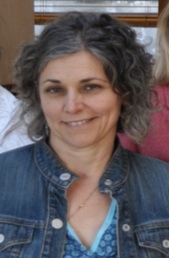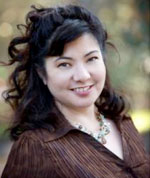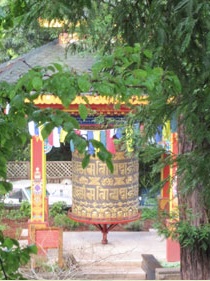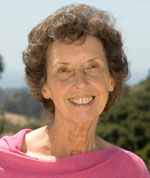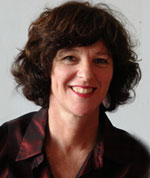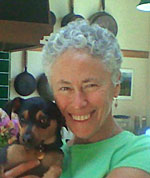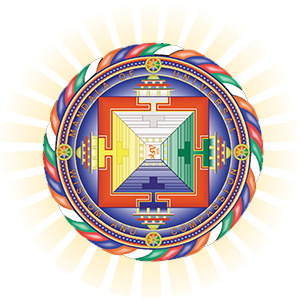Tara Home History
Tara Home was established in 2002 by Lennie Kronisch and Petra McWilliam (Venerable Tenzin Chogkyi) to fill the pressing need for a local community, end-of-life residential care home.
Lennie Kronisch, founder
Lennie, born on August 6, 1935, comes from a family of care givers. Lennie’s mother worked in a doctor’s office, and her uncle was a doctor. Lennie studied at Mount Sinai Hospital in New York City, becoming a Registered Nurse in 1955. Lennie married (a doctor) shortly before graduation, and together they had three children: in birth order, two sons and a daughter. Two of her children followed in their family footprints, also choosing health care professions. Her younger son became a physician, and her daughter a Feldenkrais practitioner (a system of movement reeducation). In 1958, Lennie’s family relocated to Los Angeles; and in 1972 settled in Boulder Creek, California. In 1978, Vajrapani, a Foundation for the Preservation of the Mahayana Tradition (FPMT) center, was established in the northern-most reaches of Boulder Creek on a deeply wooded and blissfully secluded 75 acre property. Lennie recognized Vajrapani in its earliest days as her spiritual home; and has lived on the land, for at least portions of each year, since 1978. Lennie’s home on the grounds of Vajrapani is affectionately known by many as the “Gypsy Wagon”, a charming, hand-crafted, wood framed cottage built on the bed of a commercial truck. Lennie’s last nursing position before retirement was at Hospice of Santa Cruz; where she was employed as a Case Manager (in-home nursing services) between 1991 and 1995, and as the Volunteer Coordinator (administrative position) between 1995 and 1998. Timing is everything, and so it was with Lennie’s involvement with Hospice. In the second half of the 1990’s, Hospice became increasingly main stream; due in large part to the Bill Moyers PBS series “Death and Dying”, where the conservation of what constitutes a good death was openly discussed. Hospice services were increasing sought after, and Lennie became well versed in the aspects of both hands-on care and administration. As the Volunteer Coordinator, Lennie held advertised, monthly open houses to vet groups of 20-25 volunteers per month. The vetting process included review of volunteer applications, an interview with Lennie and two other established Hospice volunteers, and reference checks. Volunteers were selected to serve in three roles: in- house visitation, Hospice support (administrative roles, supply errands, etc.), and bereavement. In this role, in addition to volunteer recruitment, Lennie was charged with training, supervising, and supporting volunteers. Monthly volunteer support groups were held to debrief cases, brainstorm solutions to any challenges that arose, and provide volunteer emotional support. The importance of the care and support for both the dying person and the caregiver(s) was highlighted in this setting. At Hospice, however, Lennie encountered several troubling conditions: in order for a person with a terminal illness to be accepted into Hospice, a 24/7 responsible designee is required – so some did not qualify; some could not stay in their current residence to die; many at end-of-life, after experiencing long illnesses, had depleted both their financial resources and/or family/caregiver support; and many were fearful of death.
Venerable Tenzin Chogkyi, Founder
Petra was co-director of Vajrapani, later taking her vows as Ven. Tenzin Chogkyi. She had also been a Hospice volunteer at the Maitri Hospice in San Francisco during the AIDS epidemic. Petra had similar concerns regarding the absence of a local community, end-of-life residential care home. In 1996, Lennie and Petra approached Lama Zopa Rinpoche to express their concerns and seek his advice. Lama Zopa felt that this type of care home was needed, and would be more appropriately located at Land of Medicine Buddha (LMB) in Soquel, California, as this FPMT center is more centrally located in the County and has more adequately improved site access. Establishing such a care home is also consistent with Lama Yeshe’s vision for LMB as a center for Universal Education, a non-denominational approach to birth to death education and spiritual support steeped in Buddhist philosophy, to maximize mainstream appeal and create more far-reaching impacts.
In 1997, Lama Zopa Rinpoche blessed the Tara Home Vision Statement, as follows:
Tara Home is founded with the intent to apply the teachings of Buddha to dying, death, and bereavement in modern society.
Because suffering, change, and interdependence characterize the life of all beings, our four-fold purpose is:
1. To help the dying attain a happy, peaceful state by recognition of their positive situation;
2. To alleviate suffering through aware and compassionate support of the eddying and their loved ones;
3. To enable dying persons and their caregivers to use the process of death as an opportunity to awaken to their fully enlightened nature; and,
4. To expound and deepen societal understanding of the role of death in everyday life.
With Lama Zopa’s support secured, Lennie and Petra formed a steering committee this same year; developing the envisioned structure for and operation of a grass-roots end-of-life care home as a project under the umbrella of LMB. In 1997, Petra was promoted into the position of co-director of FPMT; and was therefore no able to volunteer for Tara Home. In April 1998, Lennie retired from her nursing career and dedicated more time to establishing a care home at LMB.
As with many causes which take form and manifest, a strong catalyst appeared to press the group into action. In 2000, Jan Fitzgerald, a dedicated Buddhist practitioner, developed terminal ovarian cancer. Lennie, as a close friend, became her advanced directive designee and assisted with coordinating her medical care. Together they discussed Jan’s impeding death, and her desire to die at LMB in robes (i.e., as an ordained Buddhist nun). Lennie saw in Jan all of the causes and conditions that had urged her to create a residential care home on the grounds of a blessed and spiritual place: Jan was living in a rented home, and was unable to remain in this home at the end of her life; she needed a strong support network to ensure a peaceful mind at the time death; and her most heart-felt wish was to die on the grounds of LMB and experience a death which coincided with her specific spiritual wishes.
Meetings to solidify plans for a care home at LMB became urgent and focused. Sally Barraud, the then Director of LMB, was very supportive of the project. Sally chose and offered an existing retreat cabin on a wooded hill situated above the gompa (mediation hall) and prayer wheels. Lennie furnished the one-bedroom, one-bath cabin as a warm and welcoming “home”, devoid of any hint of an “institutional” setting.
In February of 2002, Tara Home trained its first group of volunteer care givers (42 volunteers) at the Cabrillo College Nursing Lab in Aptos, California. The earliest volunteers included Alicia Kennedy and Truus Philipsen, who continue to be heart and core volunteers for Tara Home. Hands-on care volunteers came from health care backgrounds and beyond, creating the conditions to fill the multitude of roles needed to run a small, volunteer organization. Other Tara Home volunteers would ultimately assume leadership roles at LMB, including Denice Macy (as a hands-on care volunteer, who now serves as LMB’s Director) and Tony DeVarco (who, through fundraising, established Tara Home’s “Compassion Fund”; and now serves on the LMB Board of Directors).
In the summer of 2002, Jan became Tara Home’s first guest. As a fiercely independent and private person, Jan’s stay at Tara Home gave her the opportunity to release from her worldly attachments; and to receive the spiritual, emotional, and physical support she needed – on her own terms. Over the years, Tara Home volunteers have had the rare opportunity to assist the dying person in dying with a peaceful mind at the time of death and to support their family and friends; equipped with the valuable lessons learned and deep insights gained in caring for the unique needs of each guest at Tara Home.
Tara Home has made continuous improvements to the Tara Home cabin over years, including the addition of an enlarged and handicap-accessible bathroom, a new redwood deck and elaborate front staircase, and a paved handicap-accessible rear driveway and path to the front door. Many of these improvements were made possible by generous donations from families of our Tara Home guests.
Past and Present Directors of Tara Home
Since its inception, Tara Home has been served by Directors: Lennie Kronisch (2003-2005, and 2010-2011), Karen Schembs (2005-2009), Nicole MacArgel (2011-2013), and Alicia Kennedy (2014-present). Originally a grass-roots project under the umbrella of LMB; in 2013, Tara Home became an independent non-profit religious organization 501(c)(3), and a probationary study group of FPMT. (FPMT study groups are groups which are using this status as a probationary period before a group becomes a legal entity and a full FPMT center. FPMT Study Groups are not yet affiliated with the FPMT, and therefore do not have the same responsibilities as a center, financially or administratively. FPMT Study Groups are required to work towards becoming an FPMT center within a period of two years.) In 2014, volunteer Jackie Young, assisted the core founding members by preparing Tara Home’s first Strategic Business Plan to respond to the increasing complexity of Tara Home’s new structure. In 2014, Alicia Kennedy, RN, became Tara Home’s newest Director. Tara Home is overjoyed by Alicia’s acceptance of this position; and fortunate given her depth of clinical experience, and passion for patient advocacy and high quality, responsive, and individualized care.




